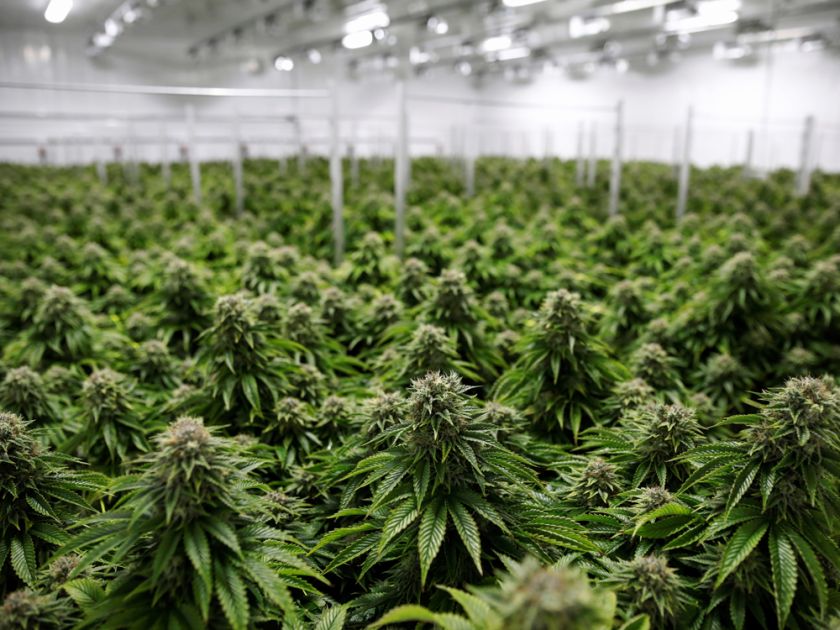You are here
Home 🌿 Marijuana Business News 🌿 Canopy Growth's B.C. shutdown shows stress in greenhouse cannabis sector 🌿Canopy Growth's B.C. shutdown shows stress in greenhouse cannabis sector

Canopy CEO David Klein cited a market that has developed slower than anticipated and challenges in raising capital for the decision to close its three million square feet of greenhouse space split between a 1.7-million-square-foot greenhouse in Delta and a 1.3-million-sq.-ft. greenhouse in Langley.
“Following a strategic review of production capacity and forecast demand, the company announced today that these facilities are no longer essential to its cultivation footprint,” Klein said in a statement.
And it’s likely that other greenhouse producers are feeling similar strains, according to industry insider Deepak Anand, CEO of the medical cannabis firm Materia Ventures.
“I wouldn’t be surprised if you see more pullback generally in the sector period,” Anand said.
Anand said some growers have discovered that outdoor cultivation is a cheaper option for production, but more generally companies struggling to make profits in a market where sales haven’t lived up to expectations can’t raise the capital they need to build or renovate greenhouses.
“Companies looking to save on capital, or cut back on capital expenses, are going to look at either not building out or scaling back on their existing builds out or not even starting to build out as the cases may be,” Anand said. “Capital markets have completely dried up.”
As of last summer, B.C.’s greenhouse sector had witnessed at least five million square feet of greenhouses, about 50 hectares — the equivalent of just over half of Burnaby’s Central Park — converted to cannabis.
Other pot producers, however, declare that they’re holding their own in a challenging business.
Pure Sunfarms, a joint venture between cannabis producer Emerald Health Therapeutics and greenhouse behemoth Village Farms, converted 1.1 million sq. ft. of tomato-growing Delta greenhouses to cannabis and has it all under cultivation, says CEO Mandesh Dosanjh.
“Pure Sunfarms’ performance in market has remained consistent since launch,” Dosanjh said in an emailed statement. “Our scale continues to put us in a strong position to grow recreational cannabis at a low cost per gram.”
Emerald Health Therapeutics, in its third-quarter financial results, reported that Pure Sunfarms recorded a net loss of $2.4 million due to a $12.6-million writedown in the value of its inventory.
Vancouver-headquartered producer Zenabis, which has secured greenhouses in Langley and an analytics lab in Delta, has slowed down some of its conversion activity, pending the approval by Health Canada of amendments to its licensing and signs that the market can absorb the product, according to Jonathan Anthony, the company’s director of investor relations.
“The general cannabis market is very tough at the moment for pretty much everybody in every single way,” Anthony said, but the company still has supply agreements with every province and “Canadian demand for legal cannabis is growing every month.”
Canopy declined to answer Postmedia News’s questions Thursday and what it plans to do with the dormant greenhouses but it’s unlikely they will wind up converted back into pepper production since the industry has moved on, according to Linda Delli Santis, executive director of the B.C. Greenhouse Growers Association.
“We’ve replaced a lot of (the converted greenhouses),” Delli Santis said. “Within our grower group, there’s been expansion and we’ve pretty much maintained equilibrium.”
The greenhouses Canopy took over were older, by the sector’s standards, and saw modifications to suit cannabis production that produce growers wouldn’t need.
“The cost of (converting back), they’d probably be better off just building new because that one’s old anyways and not really up to today’s standards,” Delli Santis said, but “anything is possible.”
420 Intel is Your Source for Marijuana News
420 Intel Canada is your leading news source for the Canadian cannabis industry. Get the latest updates on Canadian cannabis stocks and developments on how Canada continues to be a major player in the worldwide recreational and medical cannabis industry.
420 Intel Canada is the Canadian Industry news outlet that will keep you updated on how these Canadian developments in recreational and medical marijuana will impact the country and the world. Our commitment is to bring you the most important cannabis news stories from across Canada every day of the week.
Marijuana industry news is a constant endeavor with new developments each day. For marijuana news across the True North, 420 Intel Canada promises to bring you quality, Canadian, cannabis industry news.
You can get 420 Intel news delivered directly to your inbox by signing up for our daily marijuana news, ensuring you’re always kept up to date on the ever-changing cannabis industry. To stay even better informed about marijuana legalization news follow us on Twitter, Facebook and LinkedIn.




